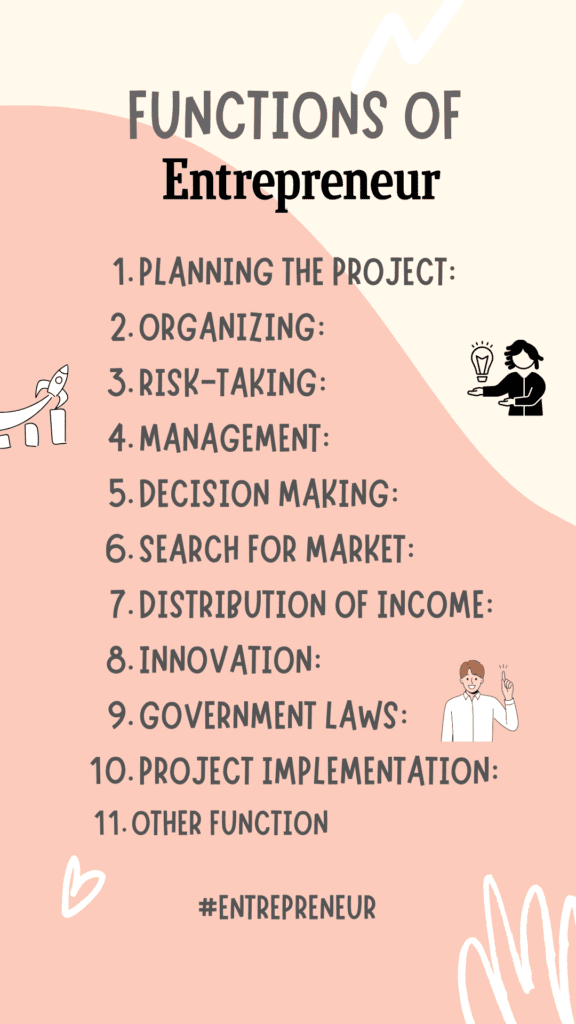An entrepreneur is someone who takes risks and starts their own business. They are like the captains of a ship, steering their company towards success. So understanding the function of Entrepreneur helpful before starting a venture. Entrepreneurs are creative and innovative, always coming up with new ideas and solutions to problems.
They are not afraid to take on challenges and are willing to work hard to achieve their goals. Without entrepreneurs, many of the products and services we enjoy today would not exist. They play a crucial role in driving economic growth and creating job opportunities.
What is Entrepreneur
An entrepreneur is someone who starts their own business and takes on financial risks in order to make a profit.
I also made a detailed article about What is Entrepreneur and its definition. you check here 👉 What is mean by Entrepreneur (Meaning and Definition) 2024
According to French Economist, Richard Cantillon an entrepreneur “is a person who buys factor services at certain prices to sell them at uncertain prices in the future“. He emphasized the function of risk-taking and uncertainty-bearing (1725).
Richard Cantillon
14 Qualities of a Successful Entrepreneur
I also mention out the Qualities of a Successful Entrepreneur you can check out 👉 14 Qualities of a Successful Entrepreneur. I just summarize the important points:
- Passion for business
- Creativity
- Willingness to make sacrifices and assume risks
- Hard work
- Desire for high achievement
- Optimism
- Foresight
- Self-confidence
- Innovative ability
- Communication skills
- Technical knowledge and willingness to change
- Determination, courage, and perseverance
- Leadership
- Team spirit
11 Key Functions of Entrepreneur

An entrepreneur may be a player within the show of business. An entrepreneur performs various functions. The following are the important functions of an entrepreneur :
Planning the project:
Planning is the primary step in the direction of setting up a venture. Before starting a business enterprise, the entrepreneur has to make valuable decisions regarding the nature and type of goods to be produced, the form of business organization, the amount of capital required, the selection of the area, the type of market and market strategies to be received, etc.
The entrepreneur has to prepare a blue-print of the proposed project including the aforesaid details. This blue-print is submitted to the authorities concerned for obtaining the legal sanction for the venture.
Organizing:
According to Alfred Marshall, an entrepreneur’s organizing and management are the enterprise’s main functions. In the modern age land, labor, and capital are scattered all over the world. It is the entrepreneur who brings together the different components of production. Land, Labour, and Capital must be organized in such a way as to maximize production or minimize costs.
He should take all risks to create an ideal use of the resources. The success or failure of an enterprise largely depends on how efficiently it carries out the organizational function. While running the business, it becomes essential on the part of the entrepreneur to make decisions regarding the expansion of the business, additional capital to be employed, etc.
An entrepreneur arranges finance for setting up the enterprise. He provides initial capital to start the venture. He also arranges additional funds required to carry on activities and expand the business.
Risk-taking and uncertainty-bearing:
Business involves many risks. Risks are inherent in all forms of business activity. There may be changes in demand and fashion, changes in market conditions, changes in consumers’ tastes, unfavourable changes in price etc. These risks are not insurable. Such non-insurable risks are called uncertainties. There may be a loss of goods in transit and also in the warehouse.
An entrepreneur has to bear all the losses and risks himself, Future is always uncertain and gloomy. There is no guarantee of getting back the amount invested in the business. Similarly, profits are not guaranteed to an entrepreneur. Sometimes losses arise. Unforeseen conditions and uncertainties give rise to risks. It is the entrepreneur who has to take risks and bear uncertainties.
Management:
An entrepreneur has to perform managerial functions also. He looks after the day-to-day working of the business. He plans, directs and controls every business activity. He formulates a production plan. He prepares marketing plans and strategies.
He organises sales. He assumes the task of personnel management. The most important function of an entrepreneur is to motivate the employees of the enterprise in the manner that the feeling of “Work is worship” among the workers.
The statement of the Chairman of an American Corporation is very important in this regard,
“We do not manufacture motor cars, aeroplanes, refrigerators, radios or the laces of shoes. We manufacture men. These men manufacture products”.
Chairman of an American Corporation
This statement makes it clear that the most important managerial function of an entrepreneur is to develop the inspiration to work among the employees.
Decision making:
Arther H. Cole has defined the entrepreneur as a decision-maker. As a decision maker, he makes various decisions regarding:
- determination of the business objectives
- Procurement of machines, materials, men, money and market
- acquisition of efficiency, technology, and new equipment
- maintenance of good relationships with public authorities and with society at large.
Search for market:
After the product is produced, the entrepreneur has to explore markets for his produce. He has to foresee the trends in the market and ascertain the nature of demand for his product. He has to appoint efficient salesmen and arrange for proper advertisements for his products through newspapers, TV, radio etc.
Distribution of income:
The entrepreneur decides the compensate for the different variables of production. He makes payments to the landlord, labourer and capitalist in the form of rent, wages and interest.
Innovation:
According to Schumpeter, innovation is the most important function of a modern entrepreneur. In his view, entrepreneurs are innovators. To innovate means to introduce something new. The entrepreneur has got to unused combinations of implies of production. As a trailblazer, an entrepreneur looks for openings, recognizes openings, and tries to abuse them.
In short, entrepreneurship flourishes with innovation. Schumpeter (1961) states that as an innovator, the entrepreneur carries out the following activities:
- Introduction of new goods,
- Introduction of new methods of production,
- Opening of new markets,
- Opening of new sources of supply, and
- Industrial reorganization.
Today, the slogan is, “Innovate or perish”. According to Kotler,
“innovate or evaporate”
Kotler
is the slogan. In short, innovation is the single most important function of an entrepreneur.
Liaison with the government:
The entrepreneur should take after the rules and controls endorsed by the government and the changes in industrial approach affected from time to time. Moreover, he has to see whether taxes are paid regularly without delay.
Project implementation:
Implementation of the project is an important function of an entrepreneur. Entrepreneurs have got to on the execution plan or the activity plan of the extend. The recognized extent is to be executed in a time-bound way. All the exercises from the conception to the commissioning are to be finished by him in understanding with the execution plan.
Other Functions:
Other functions include
- developing social atmosphere,
- rendering service to the people around him,
- fulfilling social obligations etc.
The dedication of entrepreneurs towards the performance of the above functions is so extreme that they have almost no time or attention for other aspects of life. Their divorce rate is higher than among middle managers. Entrepreneurs are married to businesses.
They have no time for lunch most days or for a quiet evening with friends. One entrepreneur was able to joke about this problem. He explained that he set aside one hour every week to spend with his wife so that she would not be excluded.
With a typical understanding of humor, Peter Drucker said,
“Entrepreneurs are the most boring dinner companions I know. All they want to talk about is their ventures. They never want to talk about anything interesting like, for example, me”.
Peter Drucker
Type of Entrepreneur
| Type of Entrepreneur | Description | Examples |
|---|---|---|
| Small Business Entrepreneurs | Establish local businesses that cater to a specific community or a small group of people. Start with limited capital from personal savings or family support | Neighborhood grocery stores, local restaurants |
| Scalable Startup Entrepreneurs | Aim for rapid growth and expansion. They seek venture capital and prioritize innovation, scalability, and disruption. | DoorDash, Airbnb |
| Large Company Entrepreneurs | Acquire or manage existing companies, focus on optimizing operations and maintaining stability. | CEOs of multinational corporations |
| Social Entrepreneurs | Combine business with a focus on creating a positive social impact. They tackle societal problems through innovative solutions. The ultimate goal is to bring about positive change in society. | TOMS Shoes, Grameen Bank |
| Innovative Entrepreneurs | Groundbreaking ideas and technologies, disrupting industries, and challenging the status quo. Their impact extends beyond profit, as they shape the future through their revolutionary ideas. | Elon Musk (SpaceX, Tesla), Steve Jobs (Apple) |
| Hustler Entrepreneurs | Resourceful and persistent individuals who excel at networking, sales, and negotiation. Their success lies in their ability to adapt to different situations and their relentless drive to achieve their goals. | Street vendors, independent consultants |
Challenges Faced by Entrepreneurs
Being an entrepreneur is an exciting journey, but it also comes with its fair share of obstacles. Here are some common challenges that entrepreneurs often encounter:
- Choosing the Right Product or Service: Entrepreneurs have to make the important decision of what to offer to their target market. Conducting market research helps them identify the needs and gaps in their local community that they can address. For example, a local entrepreneur might notice a demand for spa services in their community and decide to offer them.
- Developing an Effective Sales Strategy: Knowing your target audience and selecting the right marketing channels is crucial for success. Entrepreneurs need to create a sales strategy that resonates with their customers. For instance, if they are targeting a rural community where radio is popular, they might create digital ads to reach their audience effectively.
- Establishing Sufficient Starting Funds: Entrepreneurs often face the challenge of limited capital when starting their business. However, there are options available to them, such as bank loans, small business loans, or fundraising campaigns, to secure the necessary funds. Gradual growth and targeting a small audience initially can also be a strategic approach.
- Maintaining a Well-Structured Budget: Budgeting is essential for efficient resource allocation and financial stability. Entrepreneurs need to keep track of their finances by using financial statements like balance sheets, income statements, and cash flow statements. These statements help them monitor their progress and attract potential investors.
Skills Needed to Succeed as an Entrepreneur
To thrive as an entrepreneur, it is important to develop and cultivate certain essential skills:
- Finance Skills: Understanding budgeting, financial statements, and cash flow management is crucial for making informed financial decisions. Allocating resources wisely helps entrepreneurs avoid overspending and ensures the long-term success of their business.
- Networking: Building a strong professional network is vital for entrepreneurs. By connecting with like-minded individuals, potential team members, and industry peers, they can open doors to new opportunities and stay informed about the latest trends and developments in their field.
- Effective Communication: Being able to articulate your vision, negotiate deals, and inspire others is key to entrepreneurial success. Effective communication skills help bridge gaps and foster collaboration with employees, partners, and customers.
- Adaptability and Learning Agility: Entrepreneurship requires the ability to adapt to changing circumstances and continuously learn. Being open to change and embracing new knowledge and skills is essential for staying ahead in evolving markets.
- Marketing Knowledge: Knowing what customers want, staying updated on market trends, and building a strong brand are essential for business success. Effective marketing is key to growing a business and attracting more customers.
- Negotiation Skills: Being able to negotiate deals, form partnerships, and create contracts is crucial for business success. Successful entrepreneurs are skilled at finding mutually beneficial solutions in negotiations.
The Entrepreneurial Ecosystem:
The entrepreneurial ecosystem is a network that helps businesses thrive. Here are some key features:
- Interconnected Actors: Entrepreneurs, organizations like venture capitalists and banks, universities, and public agencies work together. Experienced entrepreneurs bring their knowledge and drive to the table.
- Social, Economic, and Political Components: Ecosystems in different regions combine social, economic, and political factors. They promote taking risks, providing funding, and fostering innovation.
- Supportive Institutions: Incubators, accelerators, and venture capitalists play a vital role in supporting startups. These institutions offer guidance, resources, and financial support.
Conclusion
To conclude the functions of an entrepreneur mainly differ from the angle of view. Here I list 11 important functions of an entrepreneur.
entrepreneurs play a vital role in the economy by creating new businesses, generating employment opportunities, and driving innovation. They take risks, identify opportunities, and bring their ideas to life.
Entrepreneurs also contribute to economic growth and development by introducing new products and services, improving efficiency, and fostering competition.
Overall, the functions of entrepreneurs are crucial for the growth and prosperity of societies.











15 Reviews